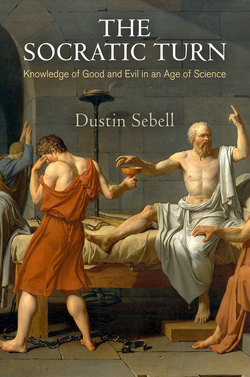The Socratic Turn

Реклама. ООО «ЛитРес», ИНН: 7719571260.
Оглавление
Dustin Sebell. The Socratic Turn
Отрывок из книги
The Socratic Turn
Knowledge of Good and Evil in an Age of Science
.....
Had the young Socrates come to a stop before the prescientific awareness of things, he would have been compelled to recognize that the bigger human being and the food are or are genuine wholes (cf. Aristotle Metaphysics 1020b6–8, 1022a33–35). And that recognition would have compelled him to concede, in turn, that nothing remains or persists unchanged in the course of human growth. At the same time that the food, in perishing, perishes into the bigger human being, the bigger human being, in coming to be, comes to be out of the food. The very being from which, according to this account, the bigger human being comes to be, therefore perishes or ceases to be altogether. However, if something of the first being out of which the subsequent being comes to be does not somehow remain or persist unchanged within that (subsequent being) which has come to be, then the latter could perhaps have come to be out of nothing. That which is, the food, in perishing, could have perished without qualification (into nothing), and that which is not yet, the bigger human being, in coming to be, could have come to be without qualification (out of nothing).
In an effort to avoid making a concession that would ultimately threaten science or its basic premise or requirement, the young Socrates refused to come to a stop before the prescientific awareness of things. He reduced both the food and the bigger human being to their materials or elements, “flesh” and “bone” and the other body parts, instead (96c9–d1, 98c6–7). And in so doing he refused to recognize what “everyone” is otherwise aware of: that the human being and the food are or are genuine wholes.14 By reducing in this way all the beings subject to the change in question to their common materials or elements, the young Socrates was able to preclude anything from coming to be or perishing without qualification. Insofar as the materials or elements at least neither come into being nor perish without qualification, they may thereby serve, since they are fixed themselves, to set fixed limits on the quality and the degree of the changes to which the perishable beings are subject.
.....